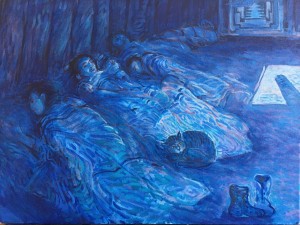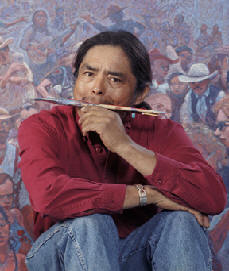
I am nine years old. I am lying in our Hoghaan awake in the middle of the night. To my left and right my brothers and cousins are sleeping soundly beneath the blankets, dreaming dreams sheepskin bedding brings. I am awake to the full rhythmic snoring and occasional cough and sleep mumbles. I am trying to fall back asleep.
My mind is full of terror and other compositions of my young life. The moonlight pouring through the smoke hole washes the interior of our hoghaan in darker shadows, forcing all things metallic to shine on the periphery of the lighted square.
At the age of nine, I still have the mysteries of my world intact. I see questions in all I still know in life. Many of these relate to stories of heroes and monsters I sit in awe hearing late into the winter night. My world is still a frightening place where spirits haunt the living and I always seem to stand out to the harshness.
The dark recesses of the hoghaan holds my attention as I imagine ancient ghosts and frightful creatures staring back. I try averting my gaze but it seems the more I try, the harder it is to ignore those vulnerable places. If I stare hard enough, the faint glow of eyes and teeth bare themselves in my late-night runaway imagination; staring into the inkiness where I know an innocent jacket and towels are hanging, where bridles and ropes hang, and where wash tubs and an axe lean against cedar posts of the wall. Some posts are lighter in shade and they take on figures I only feel and hear stalking the night outside, and those that are lying beneath sagebrushes out in the valley.
I hold the quilt closer as I feel my eyes growing drier from staring wide into the dark and frightful drama awaiting my dreams—a suspended drama for and by my own imagination and sensitivity. Cursed this night by insomnia. The hoghaan (do’awoosh’da’) is a safe and sacred home to my people, Dineh’, and from it flow all things healing and maintaining balance. Why would I now be in that holy womb in fright? The hoghaan has a valued sense of feng-shui and wabi-sabi; the clockwise motions of all who enter it and the placement of life’s responsibility in each of the four directions.
The doorway always faces the east to greet the rising sun. The place marked with White Shell and life’s entryway. The south being the direction of youth and innocence marked with turquoise. The west, the holy chores of loom works and medicine healing and marked with abalone shell. The north is the direction of wisdom, of strength as well as mystery and is marked with jet. In an unfortunate case of a death, corpses are carried out through the northern wall, dismantled, and the hoghaan is forever desecrated and abandoned as such.
The hearth sits below the smoke hole in the center of the cribbed log ceiling. I sleep in the southern side with my brothers and my parents sleep in the northern direction. This is the composition of a traditional people’s home (Dineh’ bi’ghaan). My cousin moans and mumbles something low in his sleep. The voice does not seem to fit him and that only feeds into my insecurity. I try to close my eyes as well, but there is not a way to do it. The dark smudge in the corner where the loom stands seems to shift slightly while I’m distracted by the night voice. A cough comes from my brother as he shifts on his sheepskin bedding. Someone farts. A giggle in sleep is always creepy. Each one of these boys is lost in their own nightmares of dreams and I wonder which is worse: the sleep dream drama or my current predicament?
I am a worrier and everything seems to be my concern, not the least of which is the awful boarding school situation where in two short weeks, we will return. Will my friends be back this year to remain my friends? Will the bullies ever change? What happens after eighth grade when I have to leave for another school somewhere? Who will tend to the sheep and be friends to the sheepdogs? Will my pony return to its wild ways? Deep night thoughts and revelations are often times mellowed in the light of day, but deep in the night they scratch at my brain like ants on sweets.
I think of my cat (Maasi’), the guardian of the hearth. No respectful traditional Dineh’ would deprive a hoghaan of a Maasi’, the seer. The one who moseys, ganders, prances and even invades the lairs of the malevolent conspirators. The guardian of the hearth (gish), the fire poker of juniper limb. Maasi’ purrs somewhere. Maasi’ senses spirits, I am taught. I am happy Maasi’ is present somewhere on the fringes of blankets. Maasi’ is calm, why can’t I be calm?
Little cousin cries out in his sleep like a newborn lamb. Liken to pain inflicted, I wince painfully behind the curtain of clinched eyelids. He cries. I feel like I have no means to reach out. The hoghaan is quiet late except for movements of mysteries I feel. I lay there trying to conjure up a blessing chant for the protection of homes. I replay my father and a company of male chanters, strong voices rising and falling as ancient songs petitioning the benevolent spirit. At some point in the chant, I fall asleep, a deep sleep.
P.S. These days, when I wake up on those haunting hours, I do not try to fall back asleep. I start my day. I make a pot of coffee and read or write. A great cup of coffee seems to put me back to sleep within 20 minutes—deep with lucid dreams.

